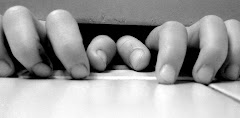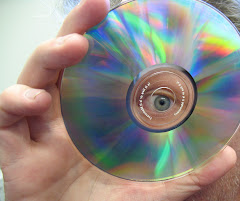
Here I go again with the guilt. And here I go again with one of this blog's recurring questions. Every form of art, and maybe even every piece of art, has its own aesthetic sensibility, no? So is it wrong to take one piece of art in one medium and try to make it one's own in one's own medium? Or is cheating? Acceptable cheating? Or is it just pure laziness? We hear sampling in music all the time, right? And let's face it: on balance we have less respect for the sampler than for the original composer.
My simple-minded way of thinking of photography is this. (Again, this is a revisited theme.) I think of photos as being either journalistic (chronicling) or arty. Obviously they can be both--or at least a journalistic photo can be visually arresting and make one think anew on a subject (how I see art in a nutshell). What I mean by chronicling is the attempt to capture a particular moment for the sake of amplifying or reinforcing or substituting it for one's own memory. I want to remember what we did on the trip and what we saw, so I take a photo of it. Which is not to say these photos are artless. One can certainly can (and should) take them with a desired effect in mind and work to make them as pleasing (or striking or meaningful, or whatever) as possible. In the division of labor in our marriage, my wife is responsible for this kind of photography.
Another impulse is to capture photos that stand alone and do not purchase their meaning from being a literal record of an event. Or if they do not stand alone, they work together largely in reference to themselves and not to a larger context. Even my photos of my monkeys come not so much from an intent to record their activities as it comes from an attempt to create an interesting photo.
Of course the lines between chronicle and art are far from clear. Consider Rembrandt's self-portraits. Their genius is (are??) amplified when they are taken as a whole, and yet their obvious unifying thread is that they track change over time of the same object. The paintings' artistry would be diminished were they not to look past themselves toward the "real" world. Right? Or perhaps not. For example, imagine that Rembrandt's paintings were not self-portraits or even portraits of someone else but rather were products purely of his imagination. Would they not be nearly as impressive and almost as revealing of genius?
At least in makes for an interesting question. In contrast, compare Rembrandt's self-portaits with Monet's haystacks. These paintings are compelling as a body of work not because we're interested in haystacks per se as much as we are are touched by their effect. In other words their value stems from the artistry itself. Even when the artist is in fact seeking representation of a subject (as Monet was), the art's genius comes not from its subject but from Monet. All genius comes from the artist, not the subject.
Or am I wrong? I could be. Picasso's Guernica means little in the absence of the real-life horrors of war. And wasn't Lincoln's literary genius amplified in the 2nd Inaugural because of the moral magnitude of his subject? Perhaps my analysis advantages "abstract" art more than necessary.
I'm not going to solve these conundrums here. Not today. Still, I did ask the questions so I should try to get back to them. I think that when a photographer is able to shift the viewer's focus away from the real-life artifact caught on film and toward what the photo has to say, then it can count as art. Even within the same medium, borrowing art can lead to original art. Think of Valesquez' portrait of the royal family in the parlor (I can't remember its name). In the background we see pre-existing paintings, but no one sees his Valesquez' painting as anything but original. Or for a more blatant and vulgarized example of borrowing within a medium, consider musical sampling. True, sampling too often substitutes for the hard work it takes to come up with an original tune, but it need not. For example, Eminem's "sample" (cover?) of Aerosmith's "Dream On" in "Sing for the Moment" is much better than the original. True, it wouldn't exist without the original, but does that mean the music from which Eminem takes his sample should somehow move me more?
Of course, all of this is moot in the absence of artistry. I don't even know what the settings on my camera mean. I just point and click and trust my intuition that there is something in what I'm looking at that makes for an interesting photo. I don't even understand photography as a craft, far less as a form of art. In fact, I'm confident that my own photographic laziness is one source of my guilt about whether I'm cheating. Were I to know more about what I'm doing, I'd have more assurance that I have contributed something new to the world.
By the way, the photo above is decidedly not art.








.jpg)




4 comments:
I used to think that I was "cheating" when I used the automatic settings on my old film-based SLR--surely one could only be a real photographer if one knows exactly which f-stop to use and so forth. Digital photography makes all of that seem like stone knives and bearskins, and therefore inherently even more "cheaty."
However, I have decided that what matters is the picture itself, not how you got there. Even with film photography and a manual camera, a good picture always requires a certain amount of serendipity. Plus, regardless of all of the settings and whatnot (used/understood or not) the bottom line is that human agency is required in producing the final product.
As such, I suppose that I am arguing for a Lockean interpretation of art: having commingled my labor/imagination/whatever with the camera to produce a product that is uniquely mine. It is art. Now, whether it is good art is for others to judge, I suppose.
A corollary to the above is that since I wholly accept the photos of others as art without worrying about how they came about the particular image (i.e., what kind of camera did they use, what setting did they employ, etc.) then why shouldn't I accept mine in the same way?
Further, I often find myself admiring photos from others that had I taken them, I would consider them mundane. Sometimes knowing what the circumstances and broader context of a given shot makes it difficult to appreciate the shot for the shot (if that makes any sense). An example: I have seen candids of people that are quite striking, but if I knew the person or the context of the photo (especially if I had taken it) I would see the person not the picture, and therefore perceive it differently.
An even more specific example: looking at pictures of your kids pre-meeting them and post-meeting them changes my perception of those pictures. No longer are they just subjects of a photo devoid of context.
Ok, enough rambling...
Since when did you get monkeys?
I'm mostly playing dumb for effect.
yo s.t.--i like how you think, especially insofar it relieves me of some guilt. always feel free to relieve me of guilt. as you did in n.o. with my little gambling episode. i am SUCH a loser.
cjs--
playing "dumb." is that a pun? as in the blind, deaf, and "dumb" monkey poses?
Post a Comment